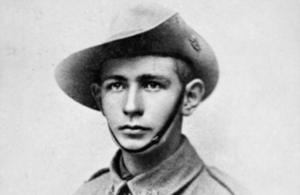WW1 Australian VC recipient Arthur Charles Hall
The story of Australian First World War Victoria Cross recipient Arthur Charles Hall.

Arthur Charles Hall [Credit: Australian War Memorial P02939.039]
66 men from Australia received the Victoria Cross, Britain’s highest award for gallantry, during the First World War. As part of the Centenary Commemorations the people of the United Kingdom marked their gratitude to those courageous men by presenting a bronze memorial plaque to their home country engraved with their names. The plaque is now displayed at the Australian War Memorial. This archive tells their stories.
Name: Arthur Charles Hall
DOB: 11 August 1896
Place of Birth: Sydney, Australia
Date of Action: 1 to 2 September 1918
Place of Action: Peronne, France
Rank: Corporal
Regiment: 54th Battalion, Australian Imperial Force
Arthur Charles Hall was born on 11 August 1896 in Sydney, Australia. He worked as an overseer on his father’s farms in New South Wales before enlisting in 1916. He joined the 54th Battalion of the Australian Imperial Force in France in February 1917, seeing action in Bullecourt and Passchendaele.
Corporal Hall was awarded the Victoria Cross for a series of actions on 1 to 2 September 1918 during the attack on Péronne, in France. His citation describes the events:
For most conspicuous bravery, brilliant leadership and devotion to duty at Peronne on 1st and 2nd September, 1918. During the attack on the 1st September a machine-gun post was checking the advance. Single-handed, he rushed the position, shot four of the occupants and captured nine others and two machine guns. Then crossing the objective with a small party, he afforded excellent covering support to the remainder of the company. Continuously in advance of the main party, he located enemy posts of resistance and personally led parties to the assault. In this way he captured many small parties of prisoners and machine guns. On the morning of the 2nd September, during a heavy barrage, he carried to safety a comrade who had been dangerously wounded and was urgently in need of medical attention, and immediately returned to his post. The energy and personal courage of this gallant non-commissioned officer contributed largely to the success of the operations, throughout which he showed utter disregard of danger and inspired confidence in all.
Hall also served during the Second World War. He later returned to his sheep and cattle farm in New South Wales. He died in 1978.